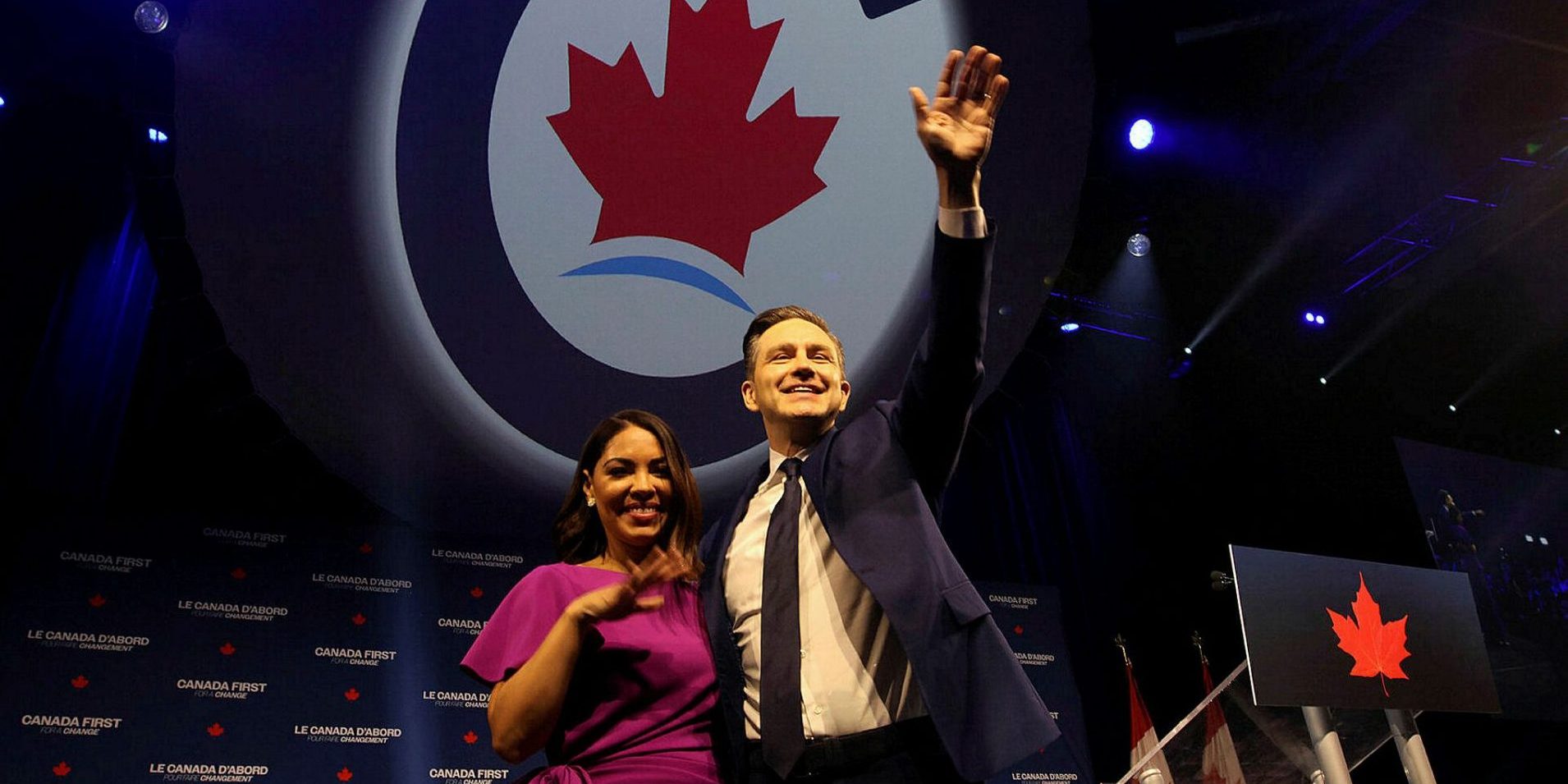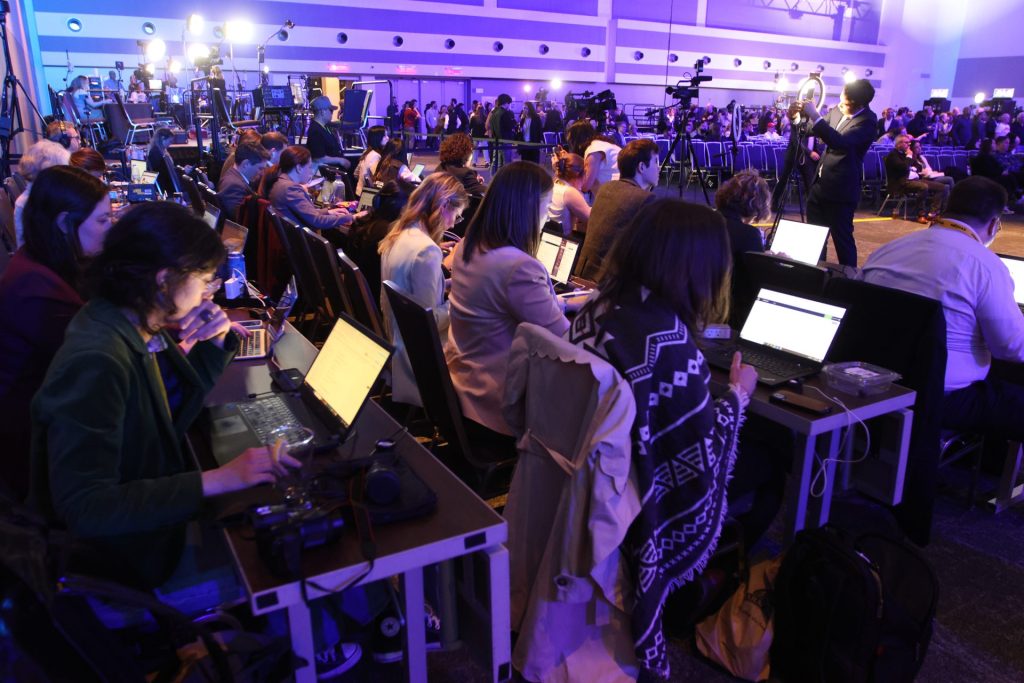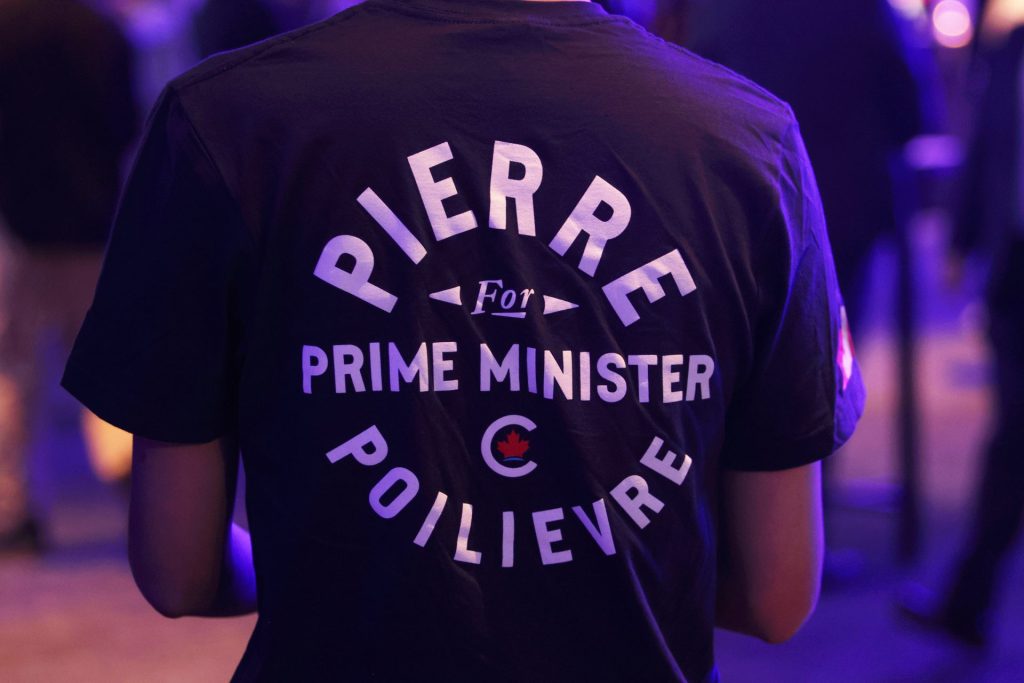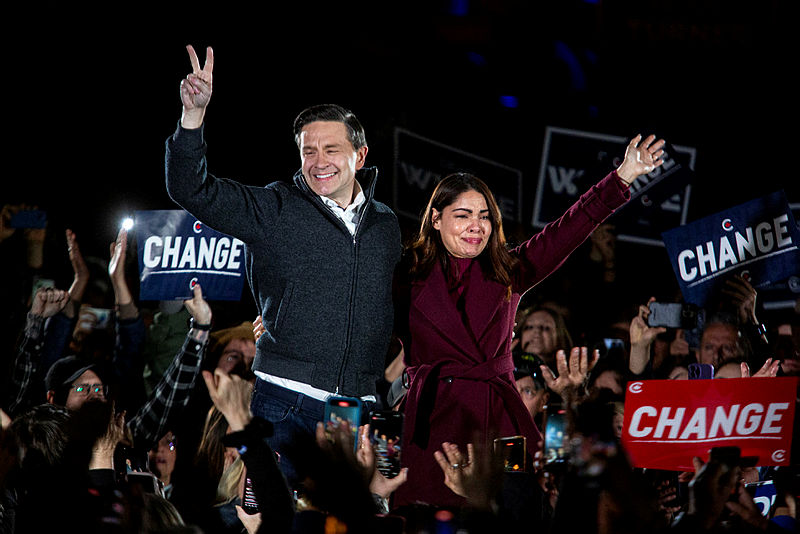‘Change takes time’: Poilievre praises ‘major’ Conservative breakthroughs in future-focused concession speech

Leader Pierre Poilievre was unable to keep his promise to deliver change in the form of a new Conservative government this election, but despite ending a hard-fought, five-week campaign in defeat, on election night Poilievre pointed to his leadership successes of broadening the party’s popular vote and a bigger caucus—though his seat would ultimately not be in that number.
“My purpose in politics is and will continue to be to restore Canada’s promise,” Poilievre told his supporters inside the Rogers Centre’s third-floor Canada Hall in Ottawa in a speech made long after polls had closed across the country hours before.
As Poilievre made the speech, his future in the next Parliament remained unclear, with Liberal challenger Bruce Fanjoy a couple thousand of votes ahead. By later that morning, Fanjoy’s lead stretched into winning territory, with the newcomer defeating the longtime Conservative MP and leader in Carleton, Ont. After 9 a.m., the seven-time MP was nearly 4,000 votes behind Fanjoy with just two polls left to report.
Taking the stage alongside his wife, Anaida, accompanied by Brett Kissel’s Our Home for one last time, he told Conservatives across the country they “could not be more proud [or] grateful,” for everything they had done for the campaign.
Party faithful waited late into the night on April 28 and into the early morning awaiting Poilievre’s speech, which began shortly after 1 a.m. on April 29, several hours after the 45th general election results had been projected to return a minority Liberal government under Prime Minister Mark Carney.
By 1 a.m., Elections Canada was reporting Liberals leading in 168 seats, the Conservatives in 144, followed by the Bloc Québécois in 23, the NDP in seven seats, and Greens with one seat held by Green co-Leader Elizabeth May. NDP Leader Jagmeet Singh, meanwhile, said he would step down as party leader after losing his seat. Early results put the Conservatives at 41.4 per cent of the total vote, exceeding the 33.7 per cent of the popular vote reached by the party in the 2021 federal election.
Poilievre described these results as “major breakthroughs,” but acknowledged some may be disappointed the party “didn’t quite get over the finish line.”
“Change takes time,” said Poilievre, who used his speech to highlight the party’s successes and path forward with him as leader. “We won the big debates of our time on the carbon tax, on inflation, on housing, on the drug crisis, on crime. Conservatives have been leading the debate, and we will continue to put forward the best arguments to improve the lives of our people right across this country.”
Delivering his concession speech to the nearly 200 patient attendees who had yet to head home, Poilievre claimed the Conservatives “denied the NDP and Liberals enough seats to form a coalition government.”

“We didn’t quite get over the finish line yet. We know that change is needed, but change is hard to come by. It takes time. It takes work.”
Earlier in the night as the polls closed, the majority of the venue’s seats were taken, with the surrounding standing-room area filling up as well, while the live-broadcast on the overhead jumbo screens projected a slight Liberal lead with just over half of the less than 100 riding results with enough counted votes for outlets to make a guess.
Two hours earlier, just after 7 p.m., the first few attendees had already begun filtering into the venue as the sun set over the Rideau Canal and a warm spring voting day. Those early-birds got first dibs at the tables selling campaign merch, or else purchased a glass of beer, wine, cocktails or a martini–paired with a fresh baked cookie or pretzel bite—as they headed into the hall to secure one of the precious spots in the rows of theatre seats.
Inside the more than 50,0000 square-foot hall entirely cast in Tory blue overhead lights, the venue was decorated much the same as it was when Poilievre was elected party leader in 2022, but in sharp contrast to the deep red that filled the room when Carney took leadership of the Liberal Party a little less than two months ago on March 9.
Alongside the second set of cash bars inside the hall, there was also a potent cocktail of anxiety, optimism, and more alcohol.
With just over 200 supporters in the room by 8 p.m.—excluding any sign of the party’s Ottawa-region candidates, former Members of Parliament, or Tory pundits and politicos—the nervous murmurs from the crowd were only occasionally broken by loud cheers. One such moment came early in the night with the first Atlantic seat projections, when the Conservatives went up three seats to two for the Grits, and again when a graphic displayed a tie with the Liberals in the popular vote.

Sharing in that anxiety were the dozens of print and online journalists scavenging for a seat at the media tables while the podcasters and broadcasters were already live and recording. Overhead, the East Coast results began to trickle in, delivered by the cycling live broadcasts from CPAC, CTV, and even the CBC, with host Rosemary Barton looming over the mainstage as The Hill Times entered the room. There was a notable silence in the room when provincial conservative strategist Kory Teneycke appeared on the big screen to deliver his analysis of the early results.
But whatever small hope the Conservatives in the room had been holding out for was pierced just after 10 p.m. when Global News was the first to call the election for the Liberals, but without a decision on a minority or majority outcome. Shortly after, CPAC began to make an election call, but the broadcast was cycled to the CBC before Michael Serapio could deliver his network’s decision.
Loyalist Public Affairs’ Dan Mader, who led the Conservatives policy and platform creation for the 2021 election, said that despite the reversal of fortunes, the final results were much closer than had been predicted in the final weeks.
“It was much tighter than expected,” Mader told The Hill Times following the first projections of a Liberal minority. “The Conservatives’ message that it was time for change clearly resonated in the closing days of the campaign.”
Yaroslav Baran, co-founder of Pendulum Group and a former Conservative Party campaign communications director, told The Hill Times the Conservatives did better than the polls projected heading into Election Day, and were on track to the party’s highest vote share since 1988.
“For some … this was [an] election about who will protect Canada against the chaos and threats of Donald Trump. For many others, this was still an election about cost of living. Neither ballot question trounced the other. It just depends who [the voter] was,” said Baran. “Carney had an advantage among ‘Trump’ voters. Poilievre had an advantage among ‘cost of living’ voters.
Across the city, cheers went up inside Lansdowne Park’s de-iced hockey rink where the Liberal leader Carney had just learned he would remain as Canada’s prime minister, in an echo of the last time both major party leaders ended their respective national campaigns in the capital over 100 years ago. During that election in 1921, the Mackenzie King’s Liberals issued a crushing defeat to then-Conservative leader and prime minister Arthur Meighen, claiming 115 seats to the Tories’ 100 in the then-245 seat House of Commons.
While the polls had tightened in the campaign’s last week and buoyed Tory hopes they could still defeat the newly rejuvenated Liberals, Poilievre’s campaign was hit with one final Trumpeus ex machina, as the day began with U.S. President Donald Trump announcing his last-minute endorsement: himself.
In a long-winded Truth Social post early Monday morning, Trump said Canada should “[e]lect the man who has the strength and wisdom to cut your taxes in half, increase your military power, for free, to the highest level in the World, have your Car, Steel, Aluminum, Lumber, Energy, and all other businesses, QUADRUPLE in size, WITH ZERO TARIFFS OR TAXES, if Canada becomes the cherished 51st. State of the United States of America.”
Taking to X, Poilievre responded by telling Trump to “stay out of our election,” adding that “the only people who will decide the future of Canada are Canadians at the ballot box.”
“Canada will always be proud, sovereign, and independent and we will NEVER be the 51st state,” Poilievre wrote.
Later in the day, Poilievre posted a photo of himself and his wife, Anaida, casting their vote on the 91-candidate Carleton, Ont., ballot, and encouraged Canadians—excluding the 7.3 million early voters—to do the same if they hadn’t already.
“We voted for Change. Now it’s your turn,” said Poilievre in the post.
Over the 37-day writ period, and for several months since Trump’s victory last November, anxiety related to his administration and increasing tariff and sovereignty threats emerged as an increasingly major concern for voters.
A day before election day, April 27, roughly 30 per cent of Canadians reported that “dealing with [Trump] and the impact of his decisions” was among their top two election issues, according to a survey by Abacus Data.
In an interview with Politico released on E-day, Ontario Premier Doug Ford said that he had advised Poilievre to focus his federal election campaign on Trump and the trade war. As for why the campaign had been unable or unwilling to pivot away from its focus on former prime minister Justin Trudeau and the already-axed consumer carbon tax, Ford said, “I can’t figure it out.”
Since becoming leader, Poilievre has spent over two years building a Conservative narrative based around opposition to Trudeau and the Liberal consumer and industrial carbon price. For much of that time, until early 2025, the Conservatives enjoyed a more than 20-point lead over the governing Liberals in national polls.
However, that gap rapidly narrowed in the weeks leading up to the election as Trump’s trade war threats, Trudeau’s departure in early January, and Carney’s arrival as the new Liberal leader in March all contributed to a massive and expeditious shift in both the polls and the ground underneath Poilievre’s feet.
The results of an Abacus Data poll released a week before election day showed the Liberals leading by three points among all committed eligible voters and those who have voted, and by five among those most certain to vote and those who had voted in an advance poll.
Jaime Watt, executive chairman of Navigator Ltd. and a Conservative strategist, previously told The Hill Times that the Tories had run a “brilliantly-executed campaign” on the whole, but failed to adjust the campaign quickly enough in response to the shifting political landscape.
But by the time Poilievre made his concession speech and congratulated Carney, his Carelton, Ont., riding was still too close to call.
Ahead of election night, Poilievre also finished off his national campaign tour in his own riding just outside of the city, holding his final Canada First rally at Stanley’s Maple Lane Farm in Edward, Ont., where he stepped off his campaign bus for the last time on April 27, to a cheering crowd of more than 3,000 supporters from across the capital region.
Born and raised in Calgary, Alta., Poilievre has spent a career in politics representing the Ottawa-area riding of Carleton. First elected to the House of Commons in 2004 at the age of 25, Poilievre’s early political education came under then-prime minister Stephen Harper, under whom he held several cabinet portfolios, including democratic reform and employment and social development. In 2021, he won the seat with roughly 52 per cent as the Conservatives failed to topple the Liberal minority government. That result would lead to then Conservative Leader Erin O’Toole’s ouster and Poilievre’s eventual coronation in a landslide victory and with a majority of caucus endorsements.
Nearly 38 months later, after dozens of cross-country rallies and a makeover ditching his glasses and tie for fitted T-shirts, Poilievre closed out what at times felt like a three-year national election campaign standing in the truck bed of a classic baby-blue pickup truck as his official campaign theme, Brett Kissel’s Our Home played for the penultimate time.
On April 27, illuminated by attendees cellphones and the strings of fairy lights hung from the property’s large oak trees, Poilievre gave one last stump speech to motivate his supporters to go out and vote, but his voice—hoarse from daily rallies and press conferences—was already tinged with expectation of the coming results and determination to keep fighting.

“No matter what happens tomorrow, I will be there to fight for you; for your quality of life, for your future, for your hopes and dreams,” Poilievre told his supporters and constituents from across the capital region, as he embraced an emotional Anaida to a thunderous round of applause.
sbenson@hilltimes
jcnockaert@hilltimes.com
The Hill Times





 LICENSING
LICENSING PODCAST
PODCAST ALERTS
ALERTS













